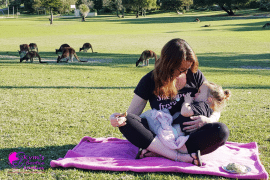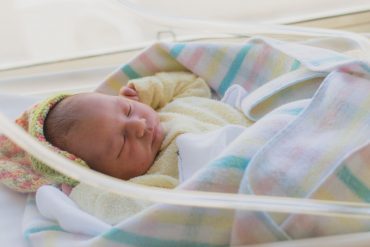There is not a standard length of time for a nursing strike and no one can tell you exactly when it might end. I have personally worked with mothers who experienced a strike for 2 or 3 weeks and their toddler did resume. I’ve also worked with mothers who just struggled for 24 hours. I’ve also heard of nursing strikes that go on even longer than 3 weeks, although that is unusual. Sometimes an older child may stick with only breastfeeding at night or when they are sleepy for a while.
When do you ‘give up’ trying? No one can answer that question for you. If I say that sometimes nursing strikes last for 3 weeks, that does not mean that you are then required by law to live in a state of desperation for 3 weeks and continue to work hard to resume breastfeeding. This depends a lot on how you are feeling and what your personal feeding goals are. What about if you have a 14-month-old and they were feeding twice a day and now they aren’t interested? They are calm. There’s nothing underlying going on, but they aren’t interested. Is that a nursing strike? Or maybe it’s self-weaning? Perhaps those previous two feeds corresponded with patterns in the daily routine and those patterns have changed and they are really not bothered about the loss of breastfeeding. Is that a strike? We could write another 3000 words on the definition of self-weaning. There isn’t an “International Committee of Self-Weaning” who will hear your history and decree whether or not your child’s story fits the criteria. Truthfully, self-weaning at 14 months is unusual but you have described a toddler who naturally drifted away from breastfeeding. That’s not the same as a toddler feeding 4-8 times who is a boob monster who suddenly behaves very differently overnight.
There is not a standard length of time for a nursing strike and no one can tell you exactly when it might end.
However, even if your toddler might be in the drifting away category, that doesn’t mean you can’t still use some of the methods we’ve discussed to try and encourage a return to breastfeeding. You are allowed to still want to continue to breastfeed. Even if you might be wondering if self-weaning IS your situation, that does not mean you are required to walk away without trying anything. We are very focused on responsive feeding and child-led breastfeeding and we are extremely sensitive to accusations that those who continue to breastfeed are doing it ‘for themselves’. We are so sensitive to that, we sometimes don’t allow ourselves to say out loud: “I really want to continue breastfeeding. I am sad that we are stopping when I thought breastfeeding was going to continue for longer.” If you can encourage your child to get another few months or weeks of antibodies and connection, that is a positive. They really won’t be persuaded if they don’t want to be, but you are allowed to try.
You get to decide when you want to move away from trying to breastfeed. You might feel that you can’t handle the uncertainty of when a strike might break. Perhaps you weren’t that far from reaching your feeding goals anyway and you feel that you need to move on. Before you do that, just check that you have accessed all the support that might be helpful. And be mindful of the fact your emotional reaction to the end of breastfeeding might surprise you. It is natural to experience a mourning process. This is not how you felt breastfeeding was going to end, even if you have some element of control in that you have chosen to stop persisting with breaking the strike.
Most nurslings at the 8-12 months age range WILL restart breastfeeding. We wouldn’t be here as a species if nursing strikes meant the end of breastfeeding for children this young. As it goes on, be kind to yourself. Your nursling is very likely to be feeling confused and upset too. Although it may feel like they are against you, they really are on Team Boob.
Some nursing strike stories:
Katie: “We had a nursing strike at around nine months. We had a very tough start to breastfeeding. It was three months of difficulty with trouble latching, trouble sucking, lots of pumping and bottle feeding. With nipple shields, it finally clicked for us and we had about six months of easy nice breastfeeding. Then out of nowhere, she became very upset at the breast and didn’t want any milk. I found it quite difficult because it took me back and reminded me how hard it had been at the start but I took some comfort in the fact I knew we could feed now. The only time she would take milk was when she was very tired right before bed. We went back to bottles in the day which she took some of but not a lot. Then I tried my nipple shields which I hadn’t used since the start. They did encourage her to have some. We fed using the shields for a few days. I kept trying to get rid of them but then she wouldn’t, so we used them. Then suddenly she fed again without them and we went completely back to normal as if nothing had happened. The whole thing was less than a week.”
Most nurslings at the 8-12 months age range WILL restart breastfeeding.
Kate: “My little boy had a 24 hour nursing strike at eight months which all seemed to be due to his first teeth coming through. He cried and cried and wouldn’t be fed all night and all the next day and then he started again when my husband got him to sleep rocking him through the night. He latched in the middle of the night in his sleep. It sounds so minor – 24 hours and maybe not even a strike – but this was a baby who had never in his life gone longer than three hours without a feed overnight. I was lost, worried, shaken-up, confused, even when it had only been a few hours because he’d never refused a feed before before. It felt like a huge thing.”
Jamie Louise: “I experienced nursing strikes with my first and second during respiratory or ear infections. What helped me the most was reaching out to my local breastfeeding support counsellor (ABA in Australia) and being able to process what was happening, try to figure out the ‘why’ (because that can help with the resolution) and find a safe place to pour out all the emotions that came with the strike. I’d offer but tried to remain calm if turned down. Once my middle child with recurrent ear infections started antibiotics, he was straight back on. He had four infections in the first 18 months so strikes were frequent. I asked my GP to see an ENT specialist and he ended up with grommets before two. Advocate for yourself and baby if needed with healthcare professionals, should the issue be recurring due to an underlying medical issue.”
Daisy: “The first strike was around eight months. It shook my world. I felt totally helpless and it was just as we went into lockdown so I didn’t have anywhere to turn. I was distraught that she didn’t need me anymore. She didn’t take a bottle at all and refused any milk I would give her from a cup or spoon. I worried that she wasn’t getting what she needed. I read up on it so much and reached out on some Facebook groups with the advice I continued to try. We had baths and skin to skin. We would have long snuggles before bed and after six days she latched again. I cried and cried. One week later we found out I was pregnant so we believe it was due to this. She also had a mini strike eleven months and thirteen months. These were much shorter and we knew a bit more about how to handle them.”
Emily: “I’ve had a couple that were down to illness, ‘hand, foot and mouth disease’, so sores in the mouth and on the tongue. The first was at 13 months and I was completely unprepared. He refused to feed for a week. My mood completely dipped. I have never felt depressed like that before. In the end, I expressed, kept trying to feed during the night when he was sleepy, skin to skin, baths, mouth gel for the sores. Eventually he came back to it and we continue for 2 1/2 years. So glad I kept going as I had a lot of pressure on me at that point to stop because it would be ‘easy’.”
Lizzy: “My son fed constantly, but at nine months he wouldn’t feed when awake for three days. I nursed him once he fell asleep and expressed when he wouldn’t feed (the first time, by hand into some Tupperware we found in the car as we were out!). When he woke up on day four, it was like nothing had happened and business was as usual. I definitely feel bed sharing helped.”
I have written elsewhere about newborn breast refusal: https://www.emmapickettbreastfeedingsupport.com/twitter-and-blog/newborn-breast-refusal-why-didnt-my-baby-get-the-memo.
Thank you to doula Charlotte Harris (raisingwithinstinct.co.uk) for your support with thinking about this topic. And thank you to those on Instagram who shared your stories.
Originally published here.
After a career as a Deputy Headteacher in central London, Emma initially trained with UK charity Association of Breastfeeding Mothers, qualifying as a breastfeeding counsellor with them in 2007. She qualified as a Board Certified Lactation Consultant (IBCLC) in 2011. She recertified in 2016 and continues to offer voluntary support at groups across West Haringey and volunteers on the National Breastfeeding Helpline and ABM national helpline alongside her private lactation consultant work. You can find her on Instagram and on Twitter as @makesmilk. Her book, “You’ve Got It In You: a positive guide to breastfeeding” can be found on Amazon and from other retailers.










